

ANNUAL REPORT 2021-22
With 215 tenured/tenure-track faculty and 18 multidisciplinary research centers and institutes with funding by eight federal agencies, the College of Engineering is a leader in experiential education and interdisciplinary research focused on discovering solutions to global challenges to benefit society.
Founded in 1898, Northeastern is a global research university and the recognized leader in experiential lifelong learning. Our approach of integrating real-world experience with education, research, and innovation empowers our students, faculty, alumni, and partners to create worldwide impact.
Northeastern’s comprehensive undergraduate and graduate programs lead to degrees through the doctorate in nine colleges and schools across our global system of campuses. Learning is personalized and experiential, with a curriculum that emphasizes the intersection of data, technology, and human literacies—uniquely preparing graduates for lives of fulfillment and accomplishment.
Our research enterprise, with an R1 Carnegie classification, is solutions-oriented and spans the world. Our faculty scholars work in teams that cross not just disciplines, but also sectors— aligned around today’s highly interconnected global challenges and focused on transformative impact for humankind.
DEAR COLLEAGUES, FRIENDS, AND STUDENTS,
The Department of Civil and Environmental Engineering at Northeastern University continues to grow and expand with new faculty, facilities, and programs focused on the interconnected topics of environmental health, civil infrastructure security, and sustainable resource engineering.
Our 2022 Fall Semester begins with the launch of the new Civil and Environmental Engineering Innovation Studio, a multi-room collaborative laboratory, teaching, office, design, fabrication, and build space focused on our research and teaching missions. Our new Graduate Certificates in Climate and Engineering and Sustainability Engineering provide graduate students with a distinctive credential in the skills and knowledge needed to address emerging global challenges.
This year, we are pleased to welcome five new professors to our ranks. We are joined by three new tenure-track faculty, jointly appointed with the Department of Marine and Environmental Sciences. Assistant Professor Cristina Schultz joins us with expertise in the long-term effects of climate change on the biogeochemistry of coastal oceanic regions, James Dennedy-Frank joins us as an Assistant Professor and brings expertise in the link between water resources and watershed vegetation, and Assistant Professor Yu Miao joins us with expertise in microbial ecology and bioremediation. Research Associate Professor Nathan Post has joined the Roux Institute in Portland, Maine where he will research the mechanics of materials, renewable energy solutions, and machine learning techniques. We also welcome new Assistant Co-op Coordinator Nora Salmon to help deliver our signature experiential learning model.
Our scholars are engineering a resilient and sustainable future through cutting-edge research, education, and national and international leadership. This annual report details the exceptional academic and professional accomplishments of our faculty and students for the 2021-2022 academic year. We look forward to building a better world together.
For more details, visit our website at CEE.NORTHEASTERN.EDU.

Sincerely, Jerome Hajjar, PhD, P.E.
CDM Smith Professor and Department Chair Civil and Environmental Engineering jf.hajjar@northeastern.edu
We are a leader in experiential education and interdisciplinary use-inspired research, focused on Engineering for Society
Photo by Alyssa Stone

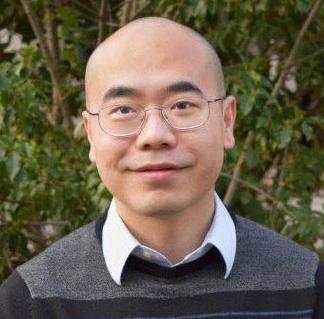
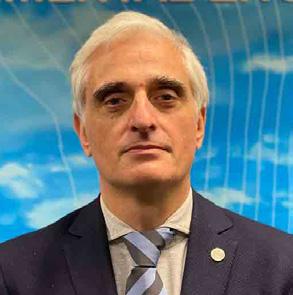
2 NORTHEASTERN UNIVERSITY CIVIL AND ENVIRONMENTAL ENGINEERING Quick Facts civil and environmental engineering Quick Facts college of engineering 116 102 Engineering Departments5 YOUNG INVESTIGATOR Awards Professional Society Fellowships Total Co-op Hires (2022) Co-op Employer Partners (2020-2022) TOTAL ENROLLMENT (Fall 2021) 54% Graduate 46% Undergraduate8,542 2,897 2,200 Including 64 NSF CAREER Awards, and 18 DOD Young Investigator Awards With 215 tenured/tenure-track faculty and 18 multidisciplinary research centers and institutes with funding by eight federal agencies, the College of Engineering is a leader in experiential education and interdisciplinary research focused on discovering solutions to global challenges to benefit society. 48% MS 31% PhD 11% BS Enrollment Growth (2016 to 2021) National Science Foundation CAREER Awards TENURED/ TENURE-TRACK including Affiliated External Research Awards (2020-2022) Young Investigator Awards Professional Society Fellowships Federally Funded Research Centers PROTECT Superfund Research Center funded by NIEHS CRECE Center for Research on Early Childhood Exposure and Development, funded by EPA and NIEHS ECHO Environmental Influences on Child Health Outcomes, funded by NIH Distinguished Research and Service Awards 1413 3 1910 47 $30M Member of National Academy of Engineering Jerome Hajjar CDM Smith Professor and Department Chair Promotions Qi Ryan Wang Associate Professor Luca Caracoglia Professor 630 Students, 44% are Women (Fall-2021)
Our Newest Faculty
P. James Dennedy-Frank Assistant Professor
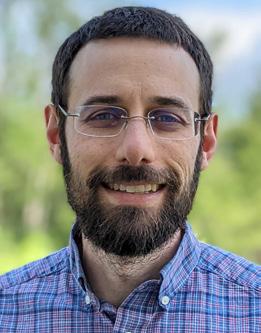
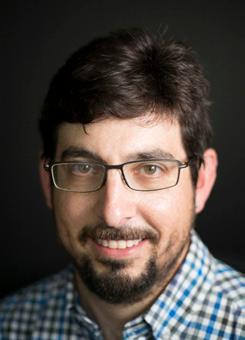
Jointly Appointed: Marine and Environmental Sciences
PhD: Stanford University, 2018
Previously: Postdoctoral Scholar, Lawrence Berkeley National Laboratory
Scholarship Focus: Ecohydrologic modeling for water resources and conservation
Fatemeh Ghoreishi Assistant Professor
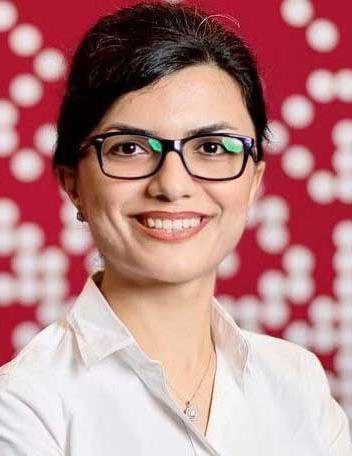
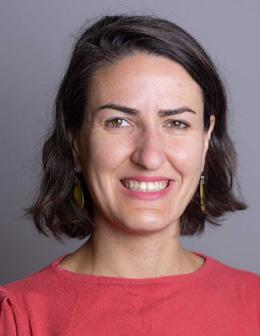
Jointly Appointed: Khoury College of Computer Sciences
PhD: Texas A&M University, 2019
Previously: Postdoctoral Researcher, University of Maryland
Scholarship Focus: Design and decision-making under uncertainty, machine learning and data analysis, Bayesian statistics, multidisciplinary design optimization
Jack Lesko Professor and Director for Engineering Research at the Roux Institute
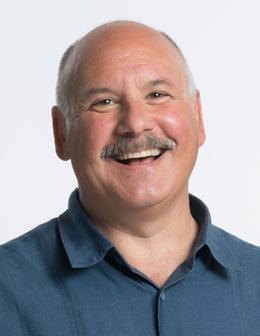
Jointly Appointed: Mechanical and Industrial Engineering
PhD: Virginia Tech, 1994
Previously: Professor, Virginia Tech
Scholarship Focus: Emerging interdisciplinary design and manufacturing of systems and structures involving lightweight polymeric multifunctional materials, structural design and reliability
Yu (Rain) Miao Assistant Professor
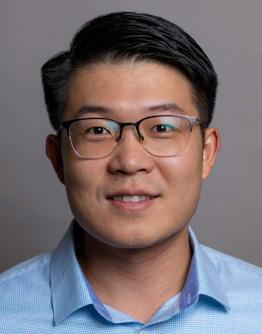
Jointly Appointed: Marine and Environmental Sciences PhD: University of California, Los Angeles, 2019
Previously: Postdoctoral Research Associate, University of California, Los Angeles
Scholarship Focus: Environmental biotechnology for water and soil quality, resource recovery, and ecosystem and public health
Nathan Post Research Associate Professor at the Roux Institute
Jointly Appointed: Mechanical and Industrial Engineering
PhD: Virginia Tech, 2008
Previously: Senior Director of R&D, WindESCo, Inc.
Scholarship Focus: Environmental biotechnology for water and soil quality, resource recovery, and ecosystem and public health
Cristina Schultz Assistant Professor
Jointly Appointed: Marine and Environmental Sciences
PhD: Massachusetts Institute of Technology, 2019
Previously: Postdoctoral Scholar, Princeton University and National Oceanic & Atmospheric Administration
Scholarship Focus: Ocean modeling, impacts of long-term climate change and of climate variability on ocean biogeochemistry
Julia Varshavsky Assistant Professor

Jointly Appointed: Health Sciences
PhD: University of California, Berkeley, 2017
Previously: Research Scientist, California Environmental Protection Agency
Scholarship Focus: Environmental exposures and maternal-child health outcomes, biomonitoring, systematic review, health and sustainability, risk assessment in vulnerable communities
3ANNUAL REPORT 2021-2022
Climate and Engineering Graduate Certificate
Climate change will be a defining challenge of the 21st century. The Graduate Certificate in Climate and Engineering is designed to provide students with foundational knowledge in the climate system and our ability to mitigate or sequester emissions and adapt to climate change. The three-course program is open to those with both engineering and non-engineering undergraduate degrees.
New Graduate Certificates Faculty by Research Area
Civil Infrastructure Security
Joseph Ayers
Dionisio P. Bernal
Luca Caracoglia Qin Jim Chen Stephen Flynn Peter Furth Auroop R. Ganguly Fatemeh Ghoreishi Jerome F. Hajjar Michael Kane Haris Koutsopoulos Jack Lesko Yiannis Levendis Sinan Müftü Andrew Myers Mark Patterson Nathan Post Mehrdad Sasani Thomas Sheahan Craig Shillaber Michael B. Silevitch Ali Touran Sara Wadia-Fascetti Ming L. Wang Qi “Ryan” Wang Mishac Yegian Moira Zellner
Sustainability Engineering Graduate Certificate
The challenges posed in building a sustainable relationship between civilization and the earth system are inherently complex and multidisciplinary. With the Graduate Certificate in Sustainability Engineering, students gain technical expertise and an ability to conceive of and participate in multidisciplinary solution development in the area of sustainability. The program is designed to provide those who have computational literacy but do not have an engineering background with knowledge and skills to collaborate effectively with engineers.
Environmental Health
Akram Alshawabkeh R. Edward Beighley Qin Jim Chen James Dennedy-Frank Matthew J. Eckelman Loretta A. Fernandez Auroop R. Ganguly Tarik Gouhier Jonathan Grabowski Brian Helmuth Julia Hopkins Randall Hughes Philip Larese-Casanova Yu Miao Amy Mueller Samuel Munoz Annalisa Onnis-Hayden Mark Patterson Kelsey Pieper Cristina Schultz Thomas Sheahan Aron Stubbins Geoffrey C. Trussell Julia Varshavsky Yang Zhang
Sustainable Research Engineering
Luca Caracoglia
Matthew J. Eckelman David Fannon
Peter Furth
Auroop R. Ganguly Tarik Gouhier Jonathan Grabowski Jerome F. Hajjar Brian Helmuth Julia Hopkins Randall Hughes Michael Kane Haris Koutsopoulos Michelle Laboy Mark Patterson
Nathan Post Cristina Schultz Craig Shillaber
Jennie C. Stephens Ali Touran Geoffrey C. Trussell Ming L. Wang Qi “Ryan” Wang Moira Zellner Yang Zhang
4 NORTHEASTERN UNIVERSITY CIVIL AND ENVIRONMENTAL ENGINEERING
Jerome F. Hajjar
Elected Member of the National Academy of Engineering
Jerome Hajjar, CDM Smith Professor and Chair of the Department of Civil and Environmental Engineering, has been elected a Member of the National Academy of Engineering (NAE). Election to NAE is considered the highest professional distinction accorded to an engineer. Hajjar was recognized for his distinguished contributions to engineering for “development of design criteria and models for stability and seismic design of innovative steel and composite structures.”
This story is continued on the next page.
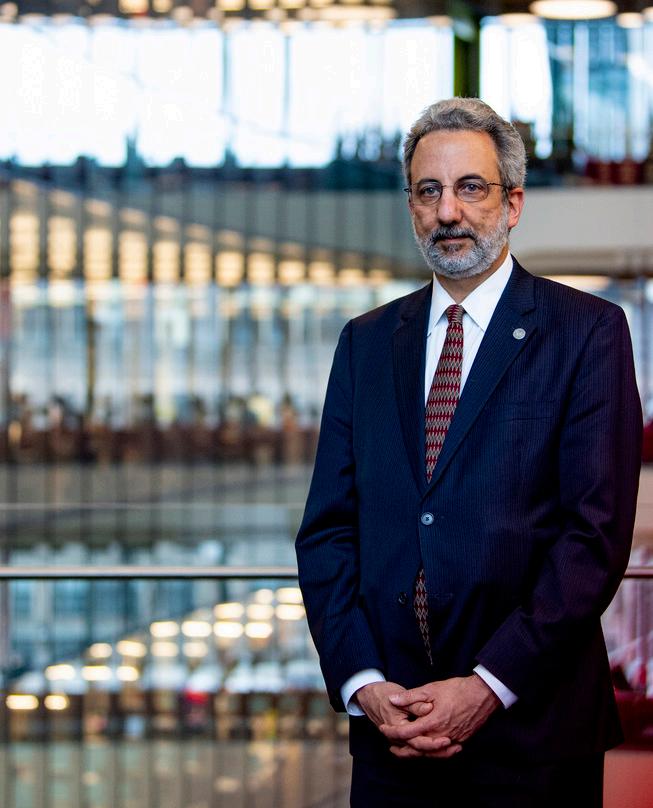
5ANNUAL REPORT 2021-2022
Photo by Alyssa Stone
Photo by Alyssa Stone
Through experimental testing, computational simulation, and the development of design concepts and criteria, Hajjar has made significant contributions to the development of innovative steel and composite steel/concrete structures. He has developed new resilient and sustainable structural systems, strength and stability design provisions for steel and composite structures, and nonlinear analysis formulations for structural stability and seismic design of steel and composite structures.
Hajjar’s work on structural stability began in the 1990s. Structural stability is the theory behind how structures withstand extreme loads without collapsing. His research contributed to new approaches for structural design for stability that are currently embedded in design specifications for steel and composite structures used throughout the U.S. and internationally. His more recent research on structural systems led to a new structural concept for resilience: All energy from an extreme event is focused into replaceable energy-dissipating components of a structure rather than the structure absorbing the energy through permanent damage of its primary structural members like beams, columns, and braces. He has also been advancing the concept of design for deconstruction, where structural systems can be taken apart at the end of the useful life of the structure and the components reused in other structures to reduce waste and the amount of energy needed for recycling. Throughout his career, Hajjar has been researching seismic behavior and design of steel and composite structures. Years of studying fundamentals related to the behavior of these structures, and seeing how they performed in extreme events, led to him rethinking their design to achieve sustainability and resilience goals for earthquakes, hurricanes, and other extreme loads, and underpins his most recent work on developing new and innovative systems.
Academy membership honors those who have made outstanding contributions to “engineering research, practice, or education, including, where appropriate, significant contributions to the engineering literature” and to “the pioneering of new and developing fields of technology, making major advancements in traditional fields of engineering, or developing/implementing innovative approaches to engineering education.”
“With the election to the NAE comes the opportunity and responsibility to serve the nation through participation in the National Academies workshops and reports on engineering issues of importance related to national security, energy, education of future engineers, resilience of urban infrastructure, and sustainability,” says Gregory D. Abowd, dean of the College of Engineering at Northeastern University.
Giving back through the work of the NAE is something Hajjar is looking forward to. “I am grateful for all the many collaborations and wonderful students I’ve had throughout my career, without whom my work would not have been possible,” he says. “I am especially grateful for the partnerships I’ve had with practitioners, industry, and academics from around the world, as well as the opportunity Northeastern has provided to innovate and collaborate.”
Abowd adds, “Under Hajjar’s leadership, the power to innovate has enabled unprecedented accomplishments in the Department of Civil and Environmental Engineering, which are reflective of the future of the fast-evolving field.”
6 NORTHEASTERN UNIVERSITY CIVIL AND ENVIRONMENTAL ENGINEERING
Under Hajjar’s leadership, the power to innovate has enabled unprecedented accomplishments in the Department of Civil and Environmental Engineering, which are reflective of the future of the fast-evolving field.”
Gregory D. Abowd Dean of the College of Engineering Northeastern University
“
CDM Professor and Chair Jerome F. Hajjar leads the Laboratory for Structural Testing of Resilient and Sustainable Systems, a 5,000 square foot research facility at Northeastern’s Burlington, Massachusetts campus.

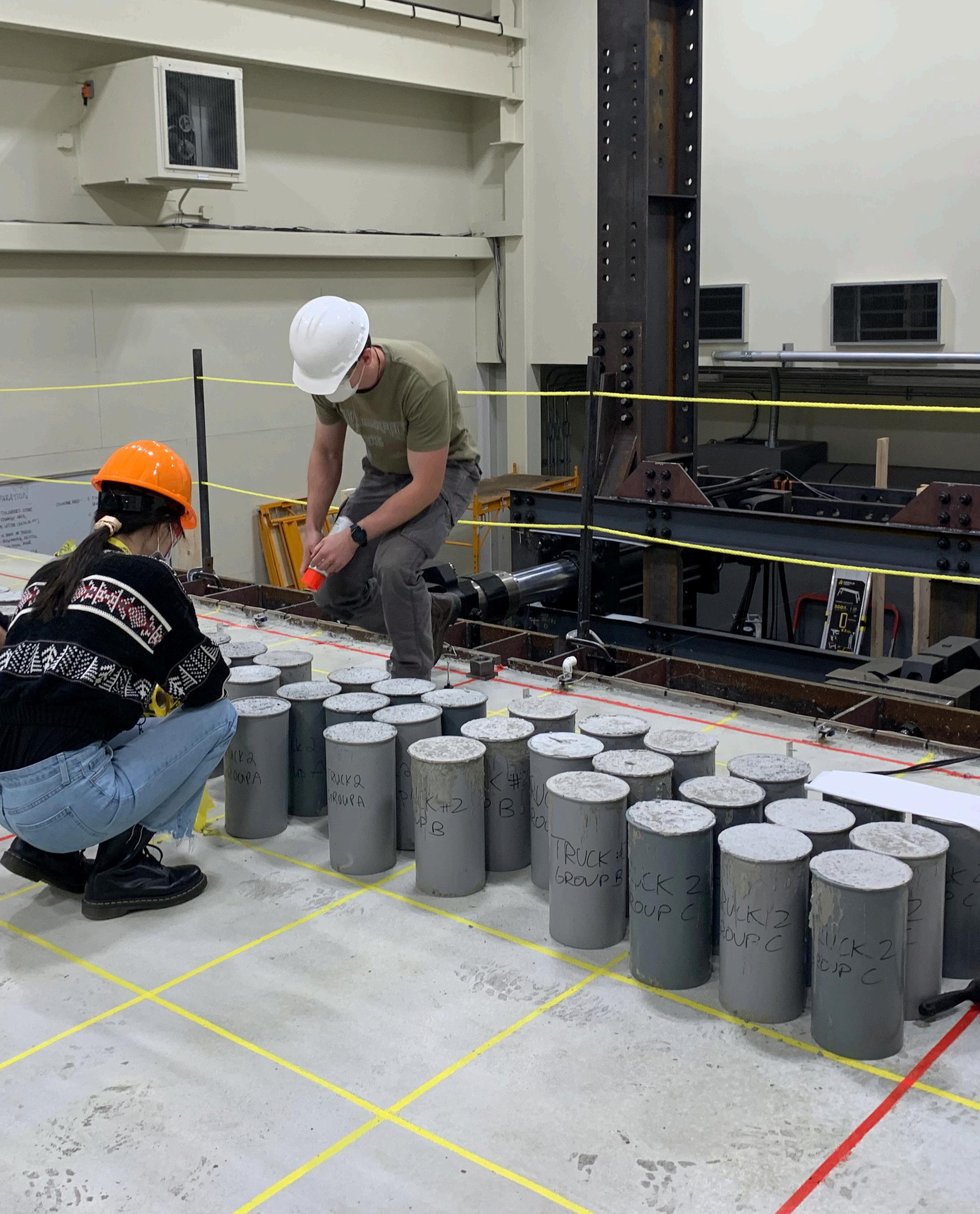
Jerome F. Hajjar Biography
Joining Northeastern University in the College of Engineering as a Professor and Chair of the Department of Civil and Environmental Engineering in March 2010, Hajjar was named Director of the Laboratory for Structural Testing of Resilient and Sustainable Systems (STReSS Laboratory) in 2011, and became an endowed CDM Smith Professor in 2014. He received the American Institute of Steel Construction (AISC) Lifetime Achievement Award in 2021, and is the past winner of the 2005 AISC T. R. Higgins Lectureship Award and the 2004 AISC Special Achievement Award. Additionally, Hajjar is a Fellow of the American Society of Civil Engineers (ASCE) and the Structural Engineering Institute (SEI) and currently serves on the SEI Board of Governors. He also won several awards from ASCE and other professional societies, including the 2000 ASCE Normal Medal, for his research and teaching on steel and composite structures, structural stability, and earthquake engineering. Since 2006, Hajjar has served on the AISC Committee on Specifications, which writes the national design specifications for steel and composite structures. He also served on several of its Task Committees, including Loads, Analysis, and Systems, Composite Design, Stability, Evaluation and Repair, and Seismic Design. He chaired the AISC Task Committees on Loads, Analysis, and Systems (2012-2015) and Composite Design (2016-present), and he led a small group to write the Commentary for the 2005 AISC Specification, which combined the Allowable Strength Design (ASD) and Load and Resistance Factor Design (LRFD) methods into one standard for the first time. Through his teaching, research, and professional activities, Hajjar has enhanced design provisions and practice that have facilitated the widespread use of structural steel and composite systems.
7ANNUAL REPORT 2021-2022
risQ Climate Modeling and Analytics Startup Acquired by Intercontinental Exchange
risQ, a climate modeling and analytics startup, was spun out from research in Professor Auroop Ganguly’s Sustainability and Data Sciences Lab. It was acquired in December 2021 by Intercontinental Exchange—one of the largest operators of electronic marketplaces.

Predicting where and when the next extreme weather event will hit, and what the financial toll will be, is pretty much a guessing game for insurance companies and other firms that deal with risk. The rare December 2021 Colorado wildfires, for example, that occurred when snow was on the ground, destroyed nearly 1,000 houses and damaged hundreds more. Homeowners began contacting their insurance companies for assistance. While insurance companies are in the business of hedging bets against the unexpected, how do they model for something as unpredictable as Mother Nature?
This is the business of the growing catastrophe modeling market that serves the insurance sector. “Counterintuitively, the insurance ecosystem is not helping society absorb the majority of the economic impacts of climate change, which is putting most of the burden on communities and low-income populations,” says alumnus Evan Kodra, interdisciplinary engineering PhD’14.
8 NORTHEASTERN UNIVERSITY CIVIL AND ENVIRONMENTAL ENGINEERING
Photo by Matthew Modoono
That is what prompted him, along with Professor Auroop Ganguly, civil and environmental engineering, and, another alum Colin Sullivan, E’14, computer engineering, to found risQ (pronounced “risk”), a climate modeling and analytics company, in 2016. The three helmed the company—Kodra as chief executive officer; Ganguly as chief scientific adviser; and Sullivan as chief operating officer—until Intercontinental Exchange (ICE) acquired the startup in December 2021. ICE is one of the largest operators of electronic marketplaces.
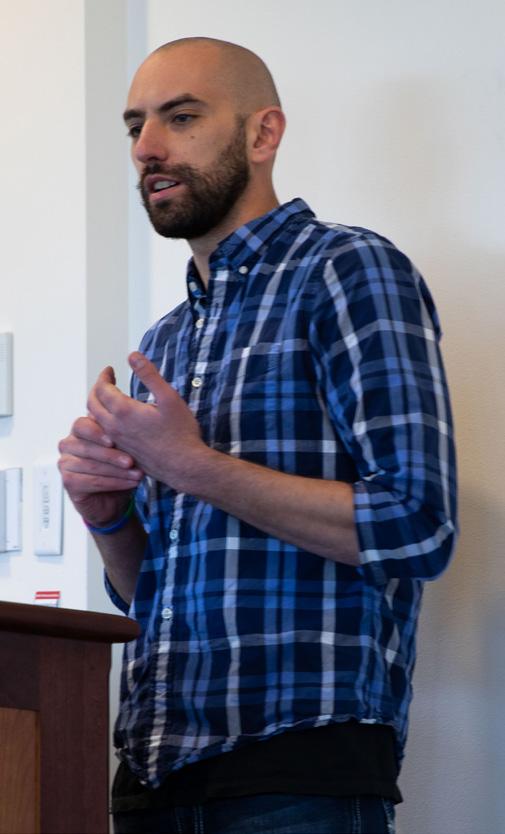
The Boston-based risQ was spun out of Ganguly’s Sustainability and Data Sciences Lab, and over its lifetime received $1.65 million in National Science Foundation Small Business Innovation Research grant funding. A landmark NSF Expeditions in Computing grant had also been critical in years past, funding much of the SDS Lab’s research that led to the founding team’s idea underpinning risQ.
The company initially targeted the insurance market but pivoted to cities and communities, where the burden of climate change is driving an early wave of small-town bankruptcies, social inequality, and alarm bells in the financial markets.
risQ’s growth came fast. The company went from one customer in the early days to more than 20 customers at the time of the acquisition—mostly financial institutions that invest in real estate-backed securities and the municipal debt issued by U.S. cities to fund water and sewer systems, schools, transit projects, and day-to-day critical services.
“Most people aren’t really aware of the municipal debt market and how it dictates so much of our built environment and socioeconomic structure. Bonds are like the credit cards of cities,” Kodra says. “We think this market will soon evolve into the primary vehicle for financing climate action in the U.S. because it’s in the best interest of not only cities but also their investors.”
Virginia Beach, a city exposed to increasing flood risk with a shoreline nearly 40 miles long, is one of the first major examples. In 2021, its residents voted to borrow more than $500 million in municipal bonds to invest in climate resilience.
risQ began a similar project recently with another city looking to improve stormwater runoff management as sea levels rise and flooding intensifies. “Our role is to do the economic and social cost-benefit analyses related to proposed climate infrastructure investments,” says Kodra.
In speaking of risQ’s acquisition Ganguly adds “To the best of my knowledge, this is the first successful ‘exit’ of a startup company focused on climate and cities.” Intercontinental Exchange and risQ first began working together in January 2020 with the launch of ICE Climate Risk, which lets investors in the U.S. municipal bond and real estate markets incorporate climate risk into project and investment decisions.
Next followed risQ’s Social Impact Scores, allowing users to quantify and invest in social causes through the municipal bond and real estate markets. With the sale of risQ a done deal, Ganguly and his lab mates are already pondering the next societal issue to tackle.
“Critical infrastructure resilience? Urban sustainability? Yes, we bring the power of America’s and the world’s entrepreneurial spirit to solve grand societal challenges of the day,” he says.
With the acquisition of risQ, Evan Kodra, PhD’14, interdisciplinary engineering, is now senior director of climate and ESG at Intercontinental Exchange. He also generously created a fellowship for future student researchers in the Sustainability and Data Sciences Lab in memory of an SDS lab student.

9ANNUAL REPORT 2021-2022
Faculty Honors and Awards
National Academy of Engineering Member
CDM Smith Professor and Chair of the Department of Civil and Environmental Engineering Jerome Hajjar was elected a Member of the National Academy of Engineering. See page 6.
Latrobe Prize from the American Institute of Architects College of Fellows
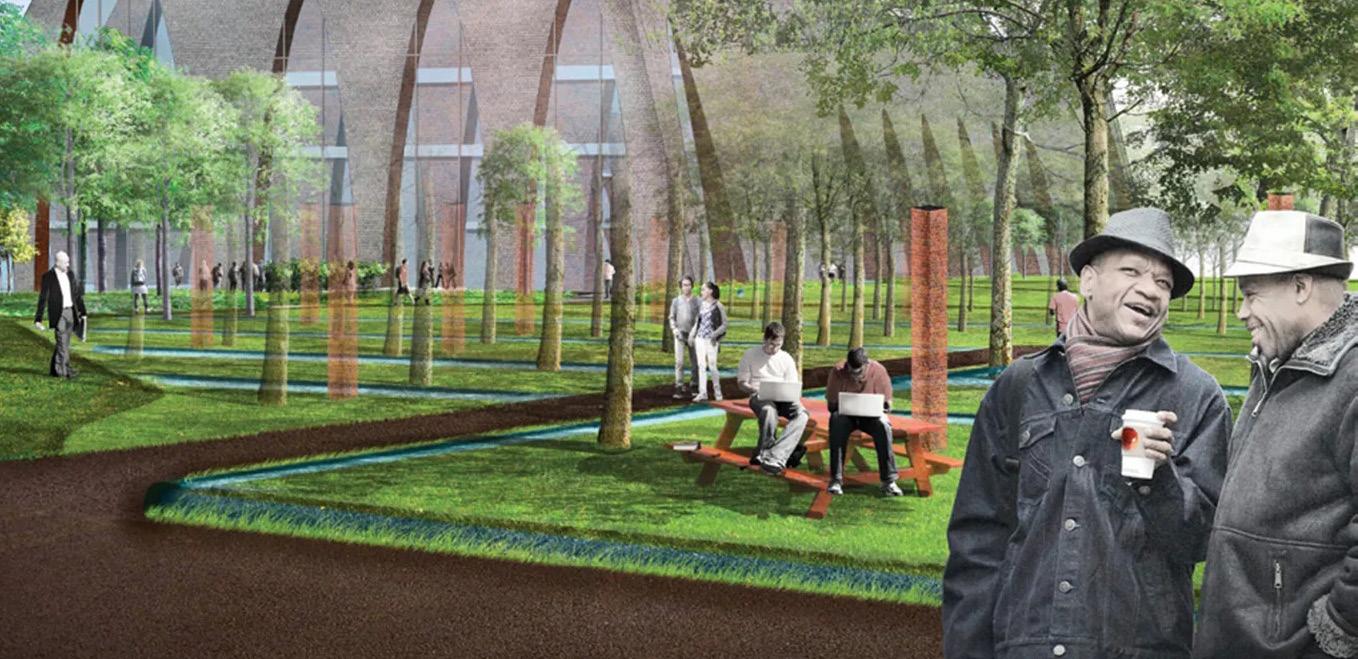
Assistant Professor Amy Mueller, civil and environmental engineering (CEE), jointly appointed in marine and environmental sciences, and Affiliated CEE Faculty Michelle Laboy, along with an interdisciplinary Northeastern team won the Latrobe Prize from the American Institute of Architects College of Fellows for their project Common SENSES (Standards for ENacting Sensor networks for an Equitable Society). SENSES is a new process for development that incorporates localized information about how a project will transform its surroundings, taken from a system of sensors and revising the role of community input in development projects. With the award funding, the research team will apply the new process to a real development project in collaboration with the city of Chelsea, Massachusetts.
Using State-of-the-Art Simulations to Determine Climate Effects on the Mississippi River
Assistant Professor Samuel Muñoz, marine and environmental sciences, jointly appointed in civil and environmental engineering, in collaboration with Rice University, was awarded a $700K National Science Foundation grant for “Evaluating the Past and Future of Mississippi River Hydroclimatology to Constrain Risk via Integrated Climate Modeling, Observations, and Reconstructions.” The project will combine state-of-theart model simulations with data describing changes in the hydrology of the Mississippi River to better understand its sensitivity to changes in climate.
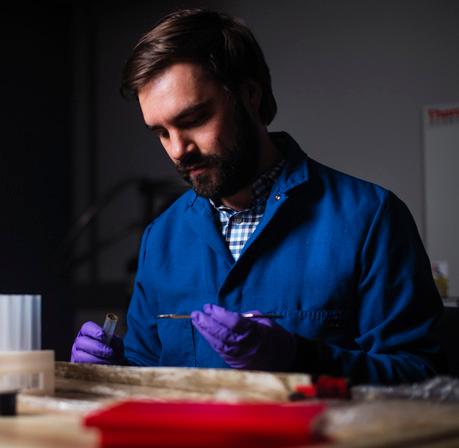
Impacts of Social Capital on Access to Safe Well Water
Associate Professor Qi Ryan Wang (PI) and Assistant Professor Kelsey Pieper of civil and environmental engineering, and Professor Daniel Aldrich of Northeastern’s College of Social Sciences and Humanities, in collaboration with the University of Virginia, are leading a $750K National Science Foundation grant for “Dynamical Coupling of Physical and Social Infrastructures: Evaluating the Impacts of Social Capital on Access to Safe Well Water.” The project will explore the use of cell phone-based mobility data to construct social networks and examine how advantageous positions within these networks may contribute to better water quality in private wells. The award is part of the NSF’s Strengthening American Infrastructure program.
Modeling Data from Hurricane Impacts to Natural and Hybrid Infrastructure
Professor Qin Jim Chen, civil and environmental engineering, jointly appointed in marine and environmental sciences, in collaboration with Louisiana State University, is leading a $765K National Science Foundation grant for “Integrated Numerical Modeling and Field Observations of Hurricane Impacts to Natural and Hybrid Infrastructure.” The research integrates morphodynamic modeling of coastal wetlands with fieldbased hydrodynamic, eco-geomorphic, and geotechnical measurements to assess and predict the performance of natural and hybrid infrastructure subject to hurricane impacts.
$1.5M NSF Award for Realtime Air Quality Monitoring and Intervention
Associate Professor Qi Ryan Wang, civil and environmental engineering (CEE), is leading a $1.5 million National Science Foundation grant, in collaboration with Associate Professor Yanzhi Wang, electrical and computer engineering, Assistant Professor Amy Mueller, CEE and marine and environmental sciences, Associate Professor Brooke Foucault Welles, Northeastern’s College of Arts, Media and Design, and Louisiana State University, to work on “Toxic-Free Footprints to Improve Community Health against Respiratory Hazards.”
They will study how human mobility (the pathway taken through the city each day) affects exposure to airborne toxins as well as how dangerous exposure levels can be more effectively communicated. The team is developing innovative tools—including air pollution sensors that collect realtime environmental data via a cell phone—as well as data-driven models that quantify the relationship between location and respiratory hazards.
Wang also, in collaboration with researchers from RPI and Columbia University, published the paper “A Spatiotemporal Decay Model of Human Mobility when Facing Large-scale Crises” in the prestigious Proceedings of the National Academy of Sciences
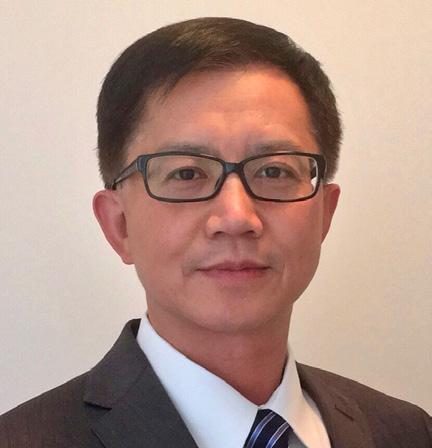
10 NORTHEASTERN UNIVERSITY CIVIL AND ENVIRONMENTAL ENGINEERING
selected
highlights
Hurricane Risk Assessment and Mitigation of Offshore Wind
CDM Smith Professor and Chair of the Department of Civil and Environmental Engineering Jerome Hajjar is leading a multi-university $650K grant from the National Offshore Wind Research and Development Consortium for “Ensuring Long-Term Availability and Bankability of Offshore Wind Through Hurricane Risk Assessment and Mitigation.” The research will quantify and assess risk of Atlantic coast hurricanes to offshore wind with a targeted, industry-driven series of investigations that span from basic atmospheric science to highly applied offshore wind engineering.
Offshore Wind Startup Wins 2022 Accelerator Grant
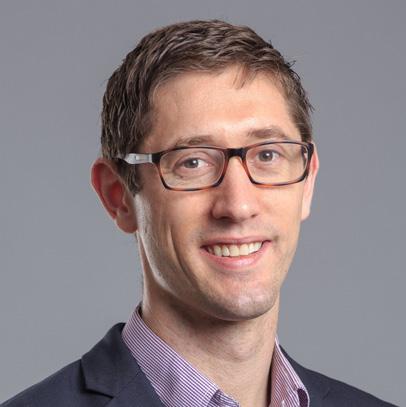
Associate Professor Andrew Myers and Senior Research Engineer Jim Papadopoulos, civil and environmental engineering, founded a startup company, T-Omega Wind, which is an innovative floating wind turbine based around technology and research developed and patented at Northeastern. Their floating wind turbine is lightweight but strong and easy to move because of its shallow draft. It is also low-cost and can be manufactured and launched in shallow ports using capabilities and infrastructure presently available in Massachusetts and the U.S. This is essential to scaling the technology so turbines can be built quickly and in huge volumes to decarbonize significant portions of the global energy sector. In 2020, Myers and Papadopoulos were winners of the Cleantech Open Northeast startup accelerator program. They also received funding from the Massachusetts Clean Energy Center’s Catalyst InnovateMass program. In 2022, they were awarded funding as well as mentoring and support in the Net Zero Technology Center’s TechX CleanEnergy Accelerator program.
Researching Microplastics Accumulation in Floodplains and Environmental and Health Impacts
Assistant Professor Samuel Munoz, marine and environmental sciences (MES), and civil and environmental engineering (CEE), CEE Professor Edward Beighley, and Professor Aron Stubbins, MES, College of Science, and CEE, were awarded a $530K National Science Foundation grant for “Evaluating Patterns and Controls on Microplastic Accumulation in Floodplains.” The research seeks to understand the sources, transport, and fate of plastics in the environment. It will also contribute to understanding when people and ecosystems may be exposed to plastics and to plastics’ potential negative health impacts.
Evaluating Earthquake Resilience in Urban Areas
Professor Mehrdad Sasani, civil and environmental engineering, was awarded a $400K National Science Foundation grant for a “Scalable Assessment of Urban Earthquake Resilience: A Novel Model-informed Deep Learning Paradigm.” This Disaster Resilience Research Grants project will enable assessment of earthquake resilience for large-scale urban building clusters via developing a fundamentally novel and scalable AI-empowered model. The outcome can be used to evaluate earthquake resilience of building clusters in large-scale urban areas.
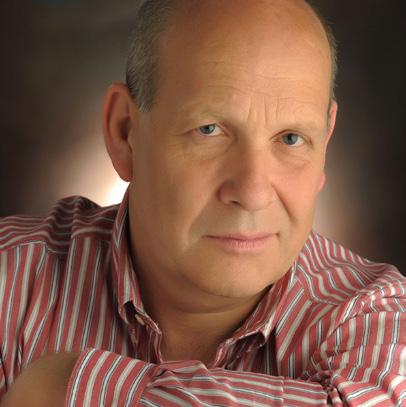
Invitation of the United Nations Environmental Programme
Professor Auroop Ganguly, civil and environmental engineering, has been invited to join the United Nations Environmental Effects Assessment Panel review for the 2022 quadrennial assessment report on the environmental effects of stratospheric ozone depletion. This is the fourth time Ganguly has been invited. He will review five of eight sections in the assessment, including sections on the response of aquatic ecosystems to the interactive effects of stratospheric ozone depletion, UV radiation and climate change as well as linkages with the COVID-19 pandemic, solar UV radiation, and the Montreal Protocol.
Floating Wetlands for Coastal Protection
Assistant Professor Julia Hopkins, civil and environmental engineering (CEE), is the lead scientist of the “Emerald Tutu,”—a nearshore wave mitigation system of interconnected circular mats of floating vegetation arranged in rings and semicircles to protect urban coasts from sea level rise and intensified storms. Other collaborators include architect and Tutu project leader Gabriel Cira, and Northeastern alumna Louiza Wise, E’21, environmental engineering. The proDisplay4ject received a Small Business Innovation research grant from the National Science Foundation in 2020 to develop the floating wetlands. Currently, the Emerald Tutu project has one mat in the water near Salem, Massachusetts, with a second set to be launched in Boston Harbor.
Learn more about our accomplished faculty

11ANNUAL REPORT 2021-2022
Student Spotlights Student Successes selected highlights
ASCE 2022 New Faces in Civil Engineering

Civil engineering alumna Annahid Dastgheib-Beheshti, E’15, was named one of the American Society of Civil Engineer’s 2022 New Faces in Civil Engineering-Professional. She is one of only 10 nationwide selected in 2022. Dastgheib-Beheshti is the current President of the Northeastern University Civil Engineering Alumni Organization and is a senior civil engineer at Arup in Boston.
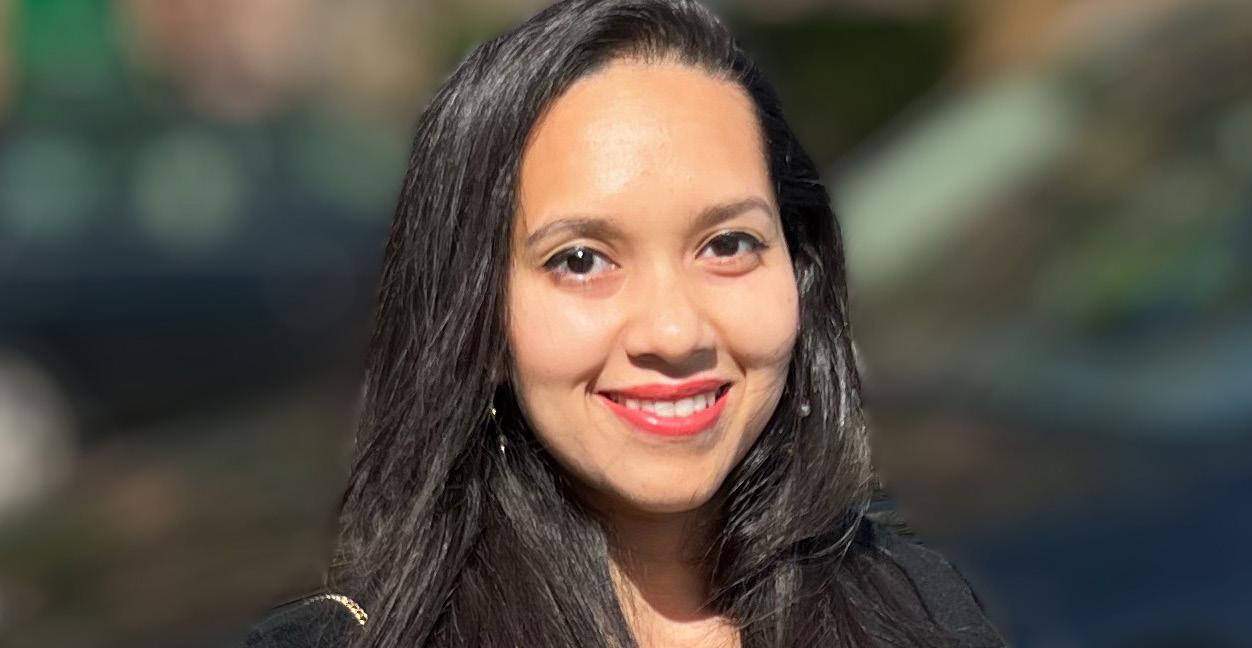
Selected for DOE 2023 Build Challenge
Sadia Khan, PhD’22
CIVIL AND ENVIRONMENTAL ENGINEERING Advised by R. Edward Beighley, Professor of Civil and Environmental Engineering
Originally from Dhaka, Bangladesh, Sadia Khan graduated from Bangladesh University of Engineering & Technology with a bachelor’s degree in civil engineering and served as a lecturer at the University of Asia Pacific in Dhaka. She joined the PhD program at Northeastern in 2017.
Northeastern’s Solar Decathlon team’s project was a winner of the Department of Energy’s Solar Decathlon Build Challenge. The team was selected to proceed in the 2023 Build Challenge, a distinction that comes with $50,000 in funding. The team was led by students Aasav Harania, MS in energy systems, and Ted Walinskas, BS in chemical engineering and MS in engineering and public policy. The team is advised by Assistant Professor Michael Kane, civil and environmental engineering.
NSF Graduate Research Fellowship and DOE iBuild Fellowship
Katherine Bassett, interdisciplinary PhD’25, received a National Science Foundation Graduate Research Fellowship. According to NSF, “Fellows are anticipated to become knowledge experts who can contribute significantly to research, teaching, and innovations in science and engineering. These individuals are crucial to maintaining and advancing the nation’s technological infrastructure and national security as well as contributing to the economic well-being of society at large.” Bassett also received a Department of Energy 2022 iBuild Fellowship. The program aims to “strengthen the pool of well-trained, diverse graduate student scholars who are equipped for research-intensive careers in fields supporting the larger mission of building energy efficiency.”
International Wastewater Design Competition Winner
A civil and environmental engineering Capstone team placed second (out of 23 schools from four countries) in the Wastewater Category of the student design competition at the Water Environment Competition at WEFTEC 2021 in Chicago. The project outlined the preliminary design and modeling of a Water Resource Recovery Facility completed for an anonymous Vermont-based creamery.
Under the guidance of Professor Edward Beighley, civil and environmental engineering, and Assistant Professor Amy Muller, civil and environmental engineering, jointly appointed in marine and environmental sciences, Khan performed research focused on characterizing nutrient export variability from urban stormwater and developing novel diversion and treatment strategies to minimize treatment costs and maximize phosphorus removal. Leveraging this research theme, Khan took part in two collaborative research projects that included both policy and engineering stakeholders: the first with the City of Cambridge, Massachusetts and Stantec, and the second with the Boston Water and Sewer Commission and Kleinfelder.
Khan’s focus on data-driven solutions for managing urban stormwater will ultimately improve challenges associated with eutrophication in freshwater systems such as the Charles River in Boston. During her doctoral studies, she published in Science of The Total Environment and presented her findings at five conferences. From connections made through her research, Khan joined Kleinfelder as a water resources engineer in the summer of 2022, and is continuing her efforts on improving our water resources.
12 NORTHEASTERN UNIVERSITY CIVIL AND ENVIRONMENTAL ENGINEERING
Interdisciplinary, Experiential, and Global
Carrie Tam, E’22, was always interested in buildings. It seemed perfect that she discovered Northeastern’s combined BS degree in civil engineering and architectural studies program, where she received both intense engineering training, along with exposure to architecture topics and design experiences.

Just like how her major is a mix of her interests, Tam also strived to make her time at university a mixture of rich experiences. She was a research assistant in the STReSS Laboratory (Structural Testing of Resilient and Sustainable Systems), conducting full-scale experimental tests on the seismic behavior of composite steel deck floor diaphragms to enhance the resilience of steel building structures. Tam also joined the Northeastern chapter of the American Institute of Architecture Students and AerospaceNU, where she served as the vice president and treasurer, respectively.
Additionally, Tam started a team for the Solar Decathlon, a competition hosted by the U.S. Department of Energy. Tam and her team participated in the Design Challenge in 2021, a one-year endeavor where the students designed and presented ideas for a zero-energy building. This year, the group is competing in the two-year build challenge, which allows the participants to locally construct the building they designed.
For her co-op, Tam worked as a structural engineering intern at Walker Consultants. “It was a valuable experience understanding how it felt to work in the field since academia is so much more theoretical,” Tam says.
Northeastern not only allowed Tam to pursue a variety of academic, extracurricular, and professional interests, but it also provided her the opportunity to explore globally as well. Tam studied abroad in Sydney, Australia for six months during her first year at Northeastern and in Copenhagen, Denmark for 10 weeks.
Carrie Tam was nominated for the U.S. Fulbright Award and received Northeastern’s Compass Award, which recognizes seniors who demonstrated dedication to a core set of values: leadership, volunteerism, academic integrity, and commitment to Northeastern.
13ANNUAL REPORT 2021-2022
from
COVER IMAGE

risQ, a climate modeling and analytics company, which is a spinout start up founded from the research conducted in Professor of Civil and Environmental Engineering Auroop Ganguly’s Sustainability and Data Sciences Lab, was acquired by International Continental Exchange—one of the largest operators of electronic marketplaces. Over its lifetime, risQ received $1.65 million in National Science Foundation Small Business Innovation Research grant funding. It also received a landmark NSF Expeditions in Computing grant. See page 8.



Photo by Adam Glanzman/Northeastern University


400 Snell Engineering Center 360 Huntington Avenue Boston, MA 02115 P 617.373.2444 cee.northeastern.edu coe.northeastern.edu Letter
the Chair 1 Fast Facts 2 Faculty Honors & Research 10 Student Successes 12


































